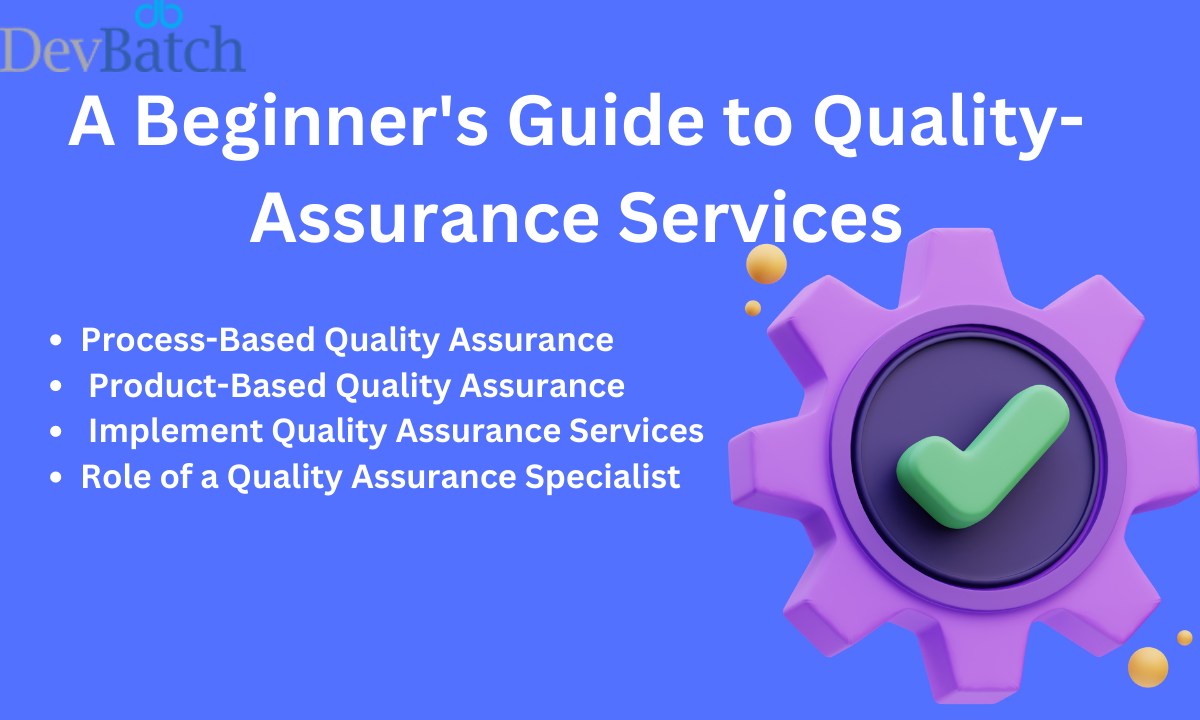QA Services play a crucial role in businesses across various sectors. They are essential for ensuring that products or services meet specific requirements and are completely error-free. For those new to this field, here’s a simple guide to help understand Quality Assurance Services.
Understanding Quality Assurance
Quality Assurance is a systematic process that determines whether a product or service meets specified standards. Its purpose is to prevent defects and promote the production of high-quality goods or services. This process ensures that end products or services adhere to predetermined criteria, encouraging overall excellence. Here are some elements:
- Quality Standards: These are set norms that a product or service must meet to be classified as ‘quality’.
- Measuring and Monitoring: Regular checking of the production process and the end product.
- Error Identifying: The process of uncovering mistakes or problems in the output.
- Error Prevention: Implementing solutions to stop errors before they occur.
Different Types of Quality Assurance Services
1. Process-Based Quality Assurance:
This form is widely used to establish a standardized production process. By following this process, inconsistencies and issues in the final product or service should be eliminated.
2. Product-Based Quality Assurance:
Product-Based QA primarily focuses on ensuring that the end product meets and exceeds customer requirements and expectations. By targeting the final outcome, this approach ensures the fulfillment of customer needs throughout
How to Implement Quality Assurance Services
The following steps guide the implementation of Quality Assurance Services in an organization:
- Develop a Plan: Create a detailed procedure for what needs to be done, when, how, and by whom.
- Define Standards: Determine the quality measures or benchmarks that the product or service must reach.
- Implement Monitoring Systems: Regularly check both the process and the product.
- Identify Errors and Deviations: If the product does not meet the standards, find out where the process went wrong.
- Take Corrective Action: Improve the process based on feedback and error identification to avoid future mistakes.
The Role of a Quality Assurance Specialist
A QA Specialist is a professional who ensures that a product or service meets predefined quality standards. Their responsibilities include:
- Establishing processes and standards.
- Overseeing the development and manufacturing operation.
- Identifying and fixing quality-related problems.
- Keeping records for future reference and continuous improvements.
Essential Qualities of a Quality Assurance Specialist
Whichever field they specialize in, Quality Assurance Specialists generally demonstrate several qualities that facilitate their work of ensuring quality.
1. Attention to Detail:
QA Specialists play a crucial role in identifying inconsistencies and errors, making keen attention to detail indispensable.
2. Problem-Solving Skills:
After spotting these errors, the specialist should possess the ability to troubleshoot and discover an efficient solution.
3. Good Communication:
In order to effectively convey their findings, it is crucial for individuals to communicate them clearly and concisely both in written reports and through verbal presentations. This ensures that stakeholders across all levels of
Quality Assurance Tools
Numerous software tools are available to provide assistance in Quality Assurance Services. Let’s take a quick look at some of the more commonly used ones:
1. Selenium:
This tool is widely utilized primarily for web applications. Its purpose is to test across various browsers, ensuring compatibility and optimal performance.
2. JIRA:
JIRA helps teams to track issues, bugs, and tasks throughout the testing process.
3. LoadRunner:
This tool serves the primary purpose of testing software performance. It effectively replicates real user loads to evaluate how the software would function in practical scenarios.
Quality Assurance Services and Customer Satisfaction
Effective Quality Assurance Services have a crucial role in enhancing customer satisfaction. By addressing inconsistencies and errors, well-executed QA Services ensure a seamless experience for customers, generating trust and confidence in the business offerings.
The Future of Quality Assurance Services
Industries are constantly evolving, and with them, Quality Assurance Services also undergo transformation. The future of QA Services is poised to exhibit distinctive characteristics:
- Increased automation has proven to be a valuable asset in streamlining and expediting the quality assurance (QA) process, with its usage projected to expand further.
- Artificial Intelligence (AI) and Machine Learning are set to revolutionize anomaly detection and error prediction, seamlessly integrating into various processes. By harnessing the power of AI and ML, businesses can efficiently identify discrepancies and
- The QA Services team is placing a greater focus on enhancing user experience. Their ongoing efforts are dedicated to ensuring that the final product delivers an optimal and satisfying user experience.
Balancing Quality Assurance and Efficiency
Implementing Quality Assurance Services involves the challenge of striking a balance between meeting quality standards and maintaining operational efficiency. Finding this equilibrium requires ongoing efforts in several key areas.
1. Invest in Training:
In order to prevent errors and ensure efficient task performance, it is crucial to have a well-trained workforce. To achieve this, regularly providing education and workshops to employees is necessary. This will help keep them updated and equipped with the necessary skills to handle quality-related tasks effectively.
2. Improve Processes:
Continuously refining processes improves efficiency and overall quality by eliminating bottlenecks and reducing errors. This leads to enhanced productivity and higher standards.
3. Measure and Monitor:
To ensure smooth progress and minimize the risk of errors, it is important to track key performance indicators (KPIs). These metrics help measure progress, identify any issues that may arise along the way, and enable timely corrective action. By monitoring KPIs closely from the start, valuable time and resources can be saved by addressing potential errors early
Quality Assurance Services in Different Industries
Quality Assurance Services play a vital role in various industries, as each industry has its own unique quality standards and requirements. Let’s take a look at a few examples: Explanation: The improved version of the sentence incorporates
1. Software Industry:
Software QA entails the verification of code quality, seamless user experience, compatibility across platforms, optimal performance, and adherence to security standards.
2. Manufacturing:
The manufacturing quality assurance (QA) process encompasses various aspects. These include evaluating materials, examining product design, scrutinizing production processes, assessing packaging, and overseeing shipping to uphold the standard of delivering
3. Healthcare:
Quality Assurance in healthcare covers several crucial areas, including patient care, safety measures, the precision of medical treatments, functional equipment, and efficient communication among healthcare providers.
4. Food and Beverage:
QA Services in this industry play a crucial role. They ensure that products meet safety standards, remain uncontaminated, and adhere to proper labeling and packaging guidelines.
Building a Successful Career in Quality Assurance Services
If you’re planning to pursue a career in Quality Assurance Services, you’ll need to consider the following steps:
1. Education:
To embark on a solid foundation of knowledge and skills, it is advisable to pursue a relevant degree aligned with your area of interest. Degrees such as computer science, engineering, or business management can serve as excellent starting points. This narrative approach provides you with essential guidance in developing expertise necessary for success. [
2. Certifications:
Obtaining specialized certifications, like the Certified Quality Auditor or Certified Software Quality Engineer, enhances your credibility and demonstrates your dedication to the field.
3. Networking:
Industry professionals can enhance their knowledge about the latest trends and opportunities in QA Services by connecting with them and participating in professional organizations. This practice not only fosters lasting relationships with peers but also opens doors to potential employers.
4. Gain Real-World Experience:
To enhance your skills and deepen your understanding of Quality Assurance Services, it is recommended to gain practical experience through internships, freelance work, and entry-level positions. These opportunities will allow you to refine your abilities and acquire invaluable expertise in
Closing Thoughts
In today’s business landscape, it is undeniable that Quality Assurance Services play a pivotal role. They ensure the highest standards for products or services. For those embarking on a career in this field, comprehending the nature, types, and implementation strategies of QA Services lays a solid foundation. Always remember that delivering quality goes beyond simply performing an action; it becomes ingrained as a habitual practice.
Weekly magazine is a knowledge hub where users can get knowledge about everything such as Lifestyle, Business, Tech, Health,magazines and much more.

